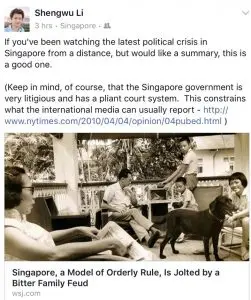In a disturbing trend sweeping through Southeast Asia, governments have been going after ordinary citizens when they share Facebook posts that are critical of the government, military, or head of state. This growing tactic of speech suppression tends to be met with a shrug by many Westerners who take open online forums for granted, but Americans should be paying more attention, because what’s happening half a world away isn’t so different from what’s happening here.
The most recent case emerges from Singapore, where the attorney general’s chambers are prosecuting Li Shengwu, a 32-year-old Singaporean academic who works at Harvard, over a private Facebook post. It is a fascinating story, full of family drama that is playing out in the public forum of social media.
The post, which Li wrote on July 15, was very a brief message, addressed to his circle of friends, in which he recommended a Wall Street Journal article that would help them understand events unfolding in Singapore. As an aside, to provide some context, Li wrote, “[T]he Singapore government is very litigious and has a pliant court system. This constrains what the international media can usually report.”

Li also provided a link to a New York Times article about the Singapore government’s history of suing international media outlets like the International Herald Tribune for defamation. A few weeks after Li casually posted this message on Facebook, Singapore’s attorney general’s chambers said it was applying for permission to prosecute Li for the post, which it describes “an egregious and baseless attack on the Singapore judiciary and constitutes a contempt of court.”
Li is a private citizen. But he also happens to be the grandson of the country’s founding leader, Lee Kwan Yew, who was instrumental in helping to transform Singapore from a small fishing village under British colonial rule into a wealthy, thriving metropolis. In a matter of decades, Lee quickly and efficiently built out Singapore’s infrastructure, but he also ensured that his party, the People’s Action Party (PAP), maintained tight control over the political system. This party has now been in power for 58 uninterrupted years since the country’s founding in 1959, and currently controls 83 of 89 elected seats in Parliament.
While Singapore was developing economically, Lee’s government kept tight control over the local media and discouraged dissenting political views. Bloggers have been jailed for criticizing the government. International media outlets including Bloomberg, The Economist, and The Wall Street Journal have all paid damages to Singapore’s rulers or had their circulation limited in the country.
Now, two years after Lee’s death, his legacy of using the courts to repress negative statements about the government continues on through his political successors. But in a strange twist of fate, it is his own grandson, Li Shengwu, who is now being prosecuted for speaking out against the government–and not in newspapers but on social media.
Family Drama On Facebook
Lee passed away in 2015. His son, Lee Hsien Loong, is now the prime minister. Over the last few weeks, Hsien Loong has been in a public spat with his sister and brother (Li Shengwu’s father) over what to do with their father’s home.
Lee Kwan Yew himself expressed in his will that he wanted his modest five-bedroom bungalow to go to his daughter, who took care of him in his last years. When she was gone, he asked for it to be torn down.
Hsien Loong, for his part, would like to preserve the house for its historical value. But his siblings say his real goal has been to cement his own political legacy and establish a dynasty. This family disagreement has unfolded publicly through Facebook posts, which have come as a shock to Singaporeans who are not used to seeing open criticism of political leaders.
Which brings us back to Li Shengwu. Until the middle of July, Li had been quietly observing the drama unfolding in Singapore while pursuing his research at Harvard. Then, all of a sudden, he was right in the middle of it.
Two weeks after Li posted the now widely circulated message, the Singapore attorney general’s office drafted an apology letter for him to sign and post on Facebook, admitting to contempt of court and to making “false and baseless” statements. He was also asked to delete the message.
Last Friday, Li declined to give into these demands and refused to sign the apology. In a new Facebook post, Li clarified that his attack was not targeting the Singapore judiciary but rather at the government which, he said, uses its own “legal rules to restrict unfavorable reporting.”
“It is not my intent to attack the Singapore judiciary or to undermine public confidence in the administration of justice. Any criticism I made is of the Singapore government’s litigious nature, and its use of legal rules and actions to stifle the free press. However, to avoid any misunderstanding of my original private post, I have amended the post so as to clarify my meaning.”
Nonetheless, Singapore’s Attorney-General’s Chambers have now commenced legal proceedings against Li.
Why Does This Matter?
The legal action against the Li Shengwu echoes what is happening in other parts of Southeast Asia and the world. Authoritarian governments find themselves forced to confront the rapid spread of social media across the region, which is designed to encourage people to freely speak their mind. My colleague Christopher Zara recently wrote about an activist in Myanmar who was jailed for a Facebook poem. And the Thai government has asked Facebook to take down any posts criticizing the monarchy, citing a local law that forbids such criticism.
As these incidents unfold, we’re seeing what happens when Facebook–a social media company born in the United States, where free speech is constitutional right–takes root in countries where there are far more limits on what people can say. The question at the heart of these growing tensions is: What point of view will win out in the end?
The answer has more to do with Americans in the age of Donald Trump than we may like to realize. Unlike previous American presidents, Trump is an isolationist, a fiercely anti-media president who is not invested in spreading democratic values around the world. Instead, he routinely dismisses journalistic outlets as “fake news,” and has praised authoritarian leaders and their methods of controlling citizens. Alarmingly, scholars and journalists are now documenting a rise of authoritarianism in the United States.
Then there are the numerous recent lawsuits designed to punish American media companies, whether it was the Peter Thiel-backed suit that put Gawker out of business, Sarah Palin’s defamation case against the New York Times, or the suspended Fox News host who filed court papers this week against the freelance journalist who reported about his alleged lewd texts. These tactics didn’t begin with Trump, but it’s hard not to make a connection between Trump’s anti-media rhetoric and what’s playing out in the courts.
Before becoming an American citizen two years ago, I was a Singaporean citizen. I grew up in Paris, Singapore, and Jakarta, because of my father’s job, but in the few years I spent in Singapore in my early teens, it was already clear to me that I did not want to live in a place where people were not free to speak openly or express negative opinions about their government. I did not want to live in a country where journalists could not report about politics without fear of retribution.
It should be frightening to all Americans that countries like Singapore are not becoming more like the United States. Rather, the United States is slowly becoming more like Singapore.
Recognize your brand’s excellence by applying to this year’s Brands That Matter Awards before the early-rate deadline, May 3.
